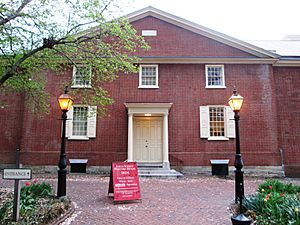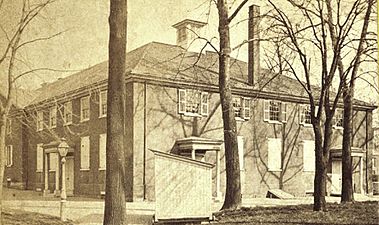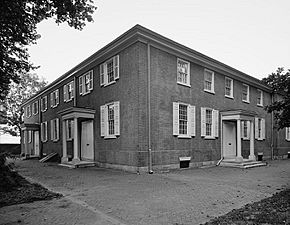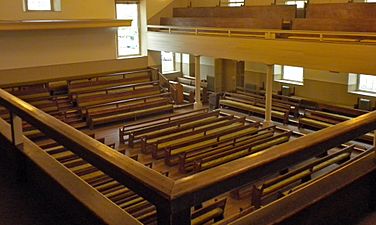Arch Street Friends Meeting House facts for kids
|
Arch Street Meeting House
|
|

(2013)
|
|
| Location | 320 Arch Street Philadelphia, Pennsylvania |
|---|---|
| Built | 1803–05, 1810–11 |
| Architect | Owen Biddle, Jr. (central structure and east wing) |
| NRHP reference No. | 71000716 |
Quick facts for kids Significant dates |
|
| Added to NRHP | May 27, 1971 |
| Designated NHL | June 23, 2011 |
The Arch Street Friends Meeting House is a special building in Philadelphia, Pennsylvania. It's located at 320 Arch Street, right in the historic Old City neighborhood. This building is a "Meeting House" for the Religious Society of Friends, also known as Quakers.
It was built to show the Quaker ideas of being simple and treating everyone equally. What's amazing is that it has been used continuously for over 200 years and still looks much the same!
Contents
A Historic Quaker Building
The land where the Meeting House stands was given to the Quakers by William Penn in 1701. Penn was the founder of Pennsylvania and a Quaker himself. He wanted the land to be used as a burial ground.
The main part and east side of the Meeting House were built between 1803 and 1805. A Quaker carpenter named Owen Biddle, Jr. designed this part. He was also famous for writing a book called The Young Carpenter's Assistant.
Growing the Meeting House
The building became bigger in 1810–11 when the west side was added. Other architects like Walter Ferris Price also helped with its design. Later, in the late 1960s, some parts of the inside were updated. A two-story addition was also built behind the main building.
Today, the Arch Street Meeting House is still a busy place. It's used for Quaker worship and many activities. It serves the local Quaker community and the larger Philadelphia Yearly Meeting.
Famous Quakers Who Met Here
Many important Quakers have attended meetings at this historic building. These include Sarah and Angelina Grimke, who were sisters. They were famous for fighting against slavery and for women's rights.
Another notable person was Edward Hicks, a well-known painter. He was a cousin of Elias Hicks, another important Quaker leader.
A National Landmark
The Arch Street Meeting House is a very important historical site. It was added to the National Register of Historic Places in 1971. This list includes places that are important to American history.
In 2011, it was named a National Historic Landmark. This is an even higher honor! It received this special title because it's the only building still standing that was clearly designed by Owen Biddle.
Burial Ground History
The land around the Meeting House was Philadelphia's first burial ground for Quakers. People started being buried here as early as 1683. William Penn officially gave the land to the Quakers in 1701.
Reports from that time say that Quakers were buried here alongside "Indians, Blacks and strangers." This shows the Quaker belief in equality for all people.
Notable People Buried Here
Many interesting historical figures are buried at the Arch Street Meeting House. Here are a few:
- Charles Brockden Brown (1771–1810): He was one of America's first novelists.
- Samuel Carpenter (1649–1714): He was a close helper to William Penn. Samuel was also the first Treasurer of Pennsylvania.
- Lydia Darragh (1728–1789): She was a spy during the American Revolutionary War.
- James Logan (1674–1751): He was William Penn's secretary.
- Samuel Nicholas (1744–1790): He founded the United States Marine Corps. Every year, Marines place a wreath on his grave.
- Robert Waln (1765–1836): He was a U.S. Congressman.
- Dr. Thomas Wynne (1627–1691): He was William Penn's personal doctor. He came to America with Penn on the ship Welcome.
- Caspar Wistar (1761–1818): A famous American doctor and professor. He helped Meriwether Lewis before his famous journey with William Clark.
Gallery
Images for kids
 | Percy Lavon Julian |
 | Katherine Johnson |
 | George Washington Carver |
 | Annie Easley |









